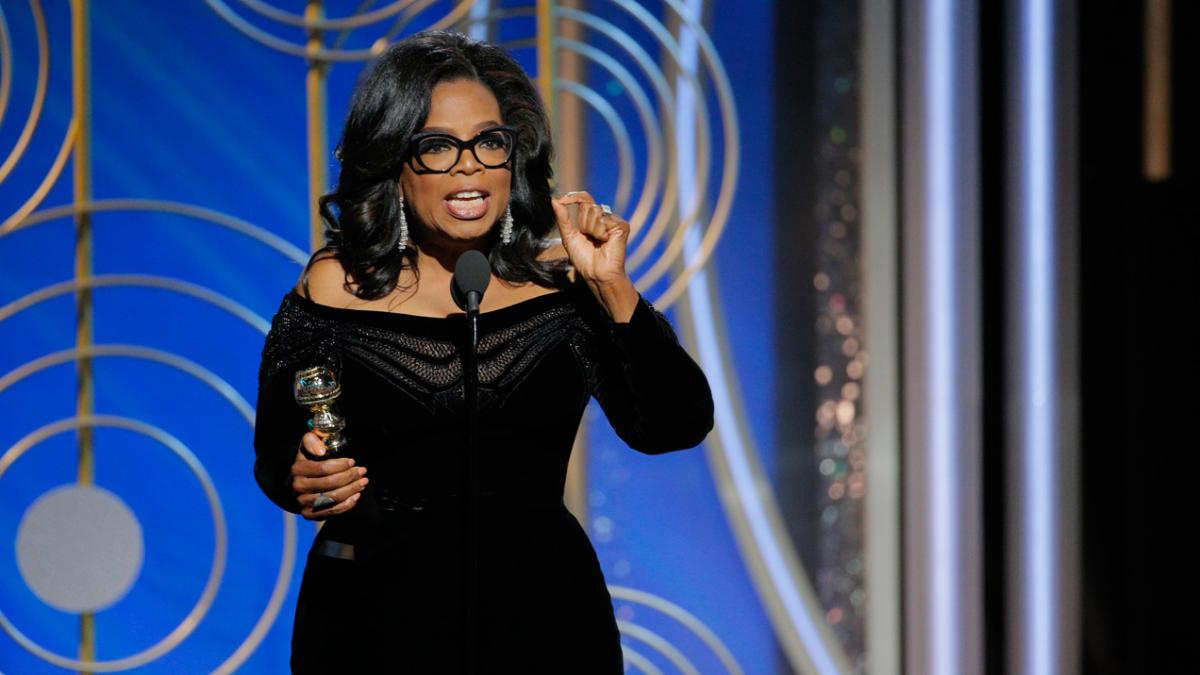
At today’s Golden Globe awards, Oprah Winfrey became the first ever black woman to receive Cecil B. DeMille Award, an honorary award bestowed by the Hollywood Foreign Press for outstanding contributions to the world of entertainment.
In her powerful, moving speech, Oprah paid tribute to actor and director Sidney Poitier (the first black person to win the award), civil rights icon Recy Taylor, her mother, all the women who spoke their truths about sexual harassment and assault, and all the women who were forced to endure it, because “they, like my mother, had children to feed and bills to pay and dreams to pursue.”
Her A Wrinkle In Time co-star Reese Witherspoon presented her with the award, and Oprah received standing ovations at the beginning of her speech, and again at the end.
Here’s her incredible speech in full.
Thank you all.
[Standing ovation.]
Okay okay! Thank you Reese.
In 1964, I was a little girl, sitting on the linoleum floor of my mother’s house in Milwaukee watching Anne Bancroft present the Oscar for best actor at the 36th Academy Awards.
She opened the envelope and said five words that literally made history.
“The winner is Sidney Poitier.”
Up to stage came the most elegant man I’d ever seen. His tie was white and of course his skin was black, and I’d never seen a black man celebrated like that.
What a moment like that means to a little girl, a kid watching from the cheap seats, as my mom came through the door, bone tired from cleaning other people’s houses.
All I can do is quote and say that the explanation of Sidney’s performance in Lilies of the Field: “Amen, amen. Amen, amen.”
In 1982 he received the Cecil B. DeMille award, and it is not lost on me that at this moment there are some little girls watching, as I become the first black woman to be given this award
It is an honour, and it is a privilege to share the evenings with all of them, and also the incredible men and women who inspire me and sustain me. Dennis Swanson who took a chance on me for A.M. Chicago. Quincy Jones, who saw me on the show and said to Steven Spielberg, she’s Sophia in The Color Purple. Gayle, who’s been a friend and Stedman, who’s been my rock.
I’d also like to thank the Hollywood Foreign Press. We all know the press is under siege, the it’s the insatiable dedication to uncovering the absolute truth that keeps us from turning a blind eye to corruption and injustice, to tyrants, and victims and secrets and lies. I want to say that I value the press more than ever before as we tried to navigate these complicated times.
And I’m especially proud and inspired by all the women who have felt strong enough and empowered enough to speak up and share their personal stories.
What I know for sure is that speaking your truth is the most powerful tool we all have, and I’m especially proud and inspired by all the women who have felt strong enough and empowered enough to speak up and share their personal stories.
Each of us in this room are celebrated because of the stories that they tell, and this year we become the story.
But it’s not just a story affecting the entertainment industry. It’s one that transcends any culture, geography, race, religious, politics or workplace. I want to express gratitude to all the women who have endured years of abuse and assault, because they, like my mother, had children to feed and bills to pay and dreams to pursue.
They’re the women whose names we’ll never know. They are domestic workers, and farm workers. They are working in factories and they work in restaurants and they’re in academia, engineering, medicine, and science. They’re part of the world in tech and politics and business. They’re our athletes in the Olympics, and they’re our soldiers in the military.
And there’s someone else: Recy Taylor. A name I know and I think you should know too. In 1944 Recy Taylor was a young wife and mother, walking home from a church service she’d attended in Abbeville, Alabama, when she was abducted by six white men, raped and left blindfolded by the side of the road coming home from church.
They threatened to kill her if she ever told anyone, but her story was reported to the NAACP where a young worker by the name of Rosa Parks became the lead investigator on her case and together they sought justice. But justice wasn’t an option in the era of Jim Crow. The men who tried to destroy her were never persecuted.
She died ten days ago, just shy of her 98th birthday. She lived as we all have lived, too many years in a culture broken by brutally powerful men. For too long women have not been heard or believed if they dared to speak their truth to the power to those men. But their time is up. Their time is up!
[Standing ovation.]
Their time is up. And I just hope that Recy Taylor died knowing that her truth, like the truth of so may other women who were tormented in those years, and even now tormented, goes marching on.
It was somewhere in Rosa Park’s heart almost eleven years later, when she made the decision to stay seated on that bus in Montgomery, and it’s here with every woman who chooses to say, “Me, too,” and with every man who chooses to listen.
In my career what I’ve always tried my best to do is to say something about how men and women really behave, to say how we experience shame, how we love and how we rage, how we fail, how we retreat, persevere, and we overcome.
I’ve interviewed and portrayed people who withstood some of the ugliest things life can throw at you, but the one quality all of them seem to share is an ability to maintain hope for a brighter morning, even during our darkest nights.
So I want all the girls watching here, now, to know that a new day is on the horizon! And when that new day finally dawns, it will be because of a lot of magnificent women, many of whom are right here in this room tonight, and some pretty phenomenal men, fighting hard to ensure that they become the leaders that take us to a time when nobody has to say “Me, too,” again.
“I want all of the girls watching here now to know, that a new day is on the horizon.”
Here is Oprah’s full speech accepting the 2018 Cecil B. DeMille Award. #GoldenGlobes pic.twitter.com/x2siib4WZI
— Kyle Griffin (@kylegriffin1) January 8, 2018



